Criminal Fiction: welcomes, congratulations and farewells
Every month, Daneet Steffens uncovers the latest goings on in mystery, suspense, and crime fiction. See previous columns on the Criminal Fiction archive page
Kicking off this month, the brand-new LitHub site, CrimeReads includes a monthly column from Sarah Weinman; congratulations are in order to Michael Connelly, winner of this year’s CWA Diamond Dagger; and finally, crime fiction loses a literary hero in Peter Temple.
Reading around: new titles on the crime fiction scene
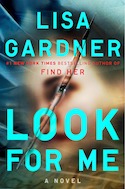
A family murdered nearly en masse, a missing teen and two determined women — one a cop, one a crime-survivor-turned-advocate-cum-avenger — make Lisa Gardner’s Look For Me (Dutton), a pacey, tautly-written mystery and quite the suspenseful humdinger. At its heart is not just a family story but a story about what makes a family, as well as a wonderful testament to the terrific work done by Court Appointed Special Advocates, the volunteers whose critical work protects children’s rights to a safe, healthy living environment.
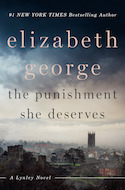
Elizabeth George’s latest Detective Lynley and Detective Sergeant Havers mystery, The Punishment She Deserves (Viking), begins with something a bit different. Havers is carted off by her superior officer and workplace nemesis, Detective Chief Inspector Isabelle Ardery, to the mellow Shropshire town of Ludlow to investigate the apparent suicide of a suspect in police custody. As the tension between the two detectives escalates — Ardery is determined to make this an open-and-shut case, while Havers’ detecting hackles hit the stratosphere as more and more odd characters and coincidences emerge — personal baggage takes over. Always terrific with her regulars’ private foibles and lives, George ups the ante here with multiple families all circling the drain of one particularly horrific set of crimes.
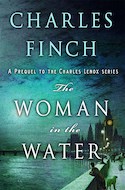
Murders on the Thames feature prominently in Charles Lenox’s origin story. In The Woman in the Water by Charles Finch (Minotaur), the 23-year-old Lenox — semi-party-boy by night, aspiring detective by day — is busy trying to establish his fledgling career and his foothold both in London’s social (read: disapproving) scene, and in the early (read: scornful) Scotland Yard. It’s enormously fun and emotionally engaging to follow Lenox, soon to become one of London’s redoubtable — if fictional — private detectives, as he navigates the murky depths of his first official case while grappling with one of life’s hardest lessons: “‘The hardest part of losing a person, Charles,’” as his father tells him, “‘is that grief is only an absence. There is nowhere to go to touch it. There is no cut that you can watch close over.’”
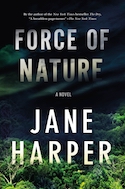
I loved Jane Harper’s The Dry, and Force of Nature (Flatiron) is an excellent follow-up. Federal Agent Aaron Falk and his partner Carmen Cooper, in pursuing their latest white-collar-crime case, have been engaging with a potential whistle-blower. When that whistle-blower goes missing during a corporate retreat in the Australian bush — in an area where a serial killer once stalked his prey, no less — the stage is set for a subtle thriller that combines a tense police investigation with the even more strained events leading up to the woman’s disappearance.
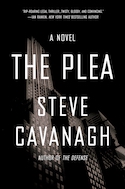
In Steve Cavanagh’s The Plea (Flatiron), lawyer Eddie Flynn, a former con artist, is tapped by the FBI to help them bring down a massive financial crime scheme, but it means treating possibly innocent people as collateral damage. Flynn, who has been blackmailed into acting on others’ behalf before, is no dummy, but he needs all his smarts for this wild ride. A nasty bit of murder, some dirty politicking, and some seriously twisted plot twists make this courtroom-dramatics-meets-con-game-antics a speedy and superbly satisfying read.
The Quintessential Interview: Eva Dolan
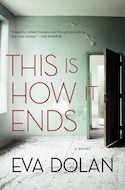
Eva Dolan’s terrific police procedural series featuring DI Zigic and DS Ferreira and their Hate Crimes Unit is a critical and well-respected hit in her native UK. Her US debut, This Is How It Ends (Bloomsbury), is a standalone mystery, addressing the accelerating — and socially damaging — gentrification of London, as seen through the eyes of two female activists who are trying to keep a partly-inhabited, low-income apartment building from being torn down.
What or who are your top five writing inspirations?
Anger is the big inspiration. Injustice. The desire to write about victims mostly ignored because they’re outsiders or at the ‘wrong’ end of the social spectrum. Wanting to do something different, even if it’s almost aggressively uncommercial. The sheer, bone-deep stubbornness of doing what I think’s right and balls to the consequences.
Top five places to write?
I would love to be the kind of writer who can work anywhere but I’m a creature of habit with very specific requirements when I sit down to actually type a book: that’s sitting on the sofa with my laptop on a cushion across my thighs. Despite the office I insisted on claiming, the lovely big kitchen table – where there’s also immediate access to coffee and biscuits – or the pretty Victorian library we’re lucky enough to still have in my nearest town and the welcoming 16th century coaching inn nearby, I couldn’t work in any of them. It’s the sofa for me.
Top five favorite authors?
Ian Rankin’s Rebus series is a huge inspiration — they were the first detective novels I read and were a template for how to write working-class crime fiction. In the same vein, John Harvey’s Resnick series really brought home to me how you can put social issues at the heart of a book and still make a compelling, driven narrative. Patricia Highsmith for psychological intensity. Cormac McCarthy for relentless commitment to the dark side. And Raymond Chandler for his depiction of sleaze in gorgeous prose.
Top five tunes to write to?
Vocal music is really distracting so I tend to go for stuff that’s mostly instrumental or, at least, unobtrusively vocal:
Anything by Mogwai, but The Hawk Is Howling is the album I listen to most often. Early Underworld, especially Second Toughest in the Infants. Massive Attack, all albums on repeat. Dirty Three have been a major find of the last few years, haunting, ethereal music underscored with a visceral sensuality — check out Horse Stories as a starting point — and in a similar vein, Warren Ellis’ and Nick Cave’s brilliant White Lunar.
Top five hometown spots?
I live in a tiny village without any amenities, so the place I tend to go most frequently is Stamford, a lovely market town a short drive away. It’s been voted the best place in the UK to live and it’s easy to see why: great restaurants and cafes, brilliant independent shops and some gorgeous Georgian architecture – fans of Jane Austen will have spotted it as the backdrop to the latest film version of Pride and Prejudice.
My bolthole there is The George Hotel’s gorgeous wood panelled and chestnut leather bar; the building dates back to the mid-10th century and almost hums with its history. I go here almost weekly for a pot of excellent hot chocolate and amaretto and tend to do a lot of my plotting in the lounge in front of the fire.
Another place steeped in history is the local Arts Centre, which has a beautiful ballroom where classes are held and a popular café serving great snacks. I’m also a big fan of its intimate little cinema, which shows classics and new movies in a very civilised setting.
This is becoming a theme but the Tobie Norris pub is a top choice for lunch and where I tend to take visitors. The menu is eclectic and always outstanding and the building itself is the quintessential English country inn, dating back to 1280, all nooks and crannies and history seeped into its stones.
Walkers Bookshop is a tiny independent which stocks a very respectable range for its size and also has a wide selection of chocolate for sale on the ground floor. I sneak in here for spur of the moment purchases and new Moleskine notebooks and to check if my friends’ books are in stock. They still don’t know I’m a local writer.
The Town Meadows is a small park in the fork of the River Welland and one of the most peaceful places in Stamford. When I was little my parents took us there to feed the ducks and the gaggle of aggressive geese which run the place. Now it’s a nice spot to pause and take a breath between the shops and a café, maybe play with one of the dogs which run around the grass there. I’m a sucker for other people’s pooches.